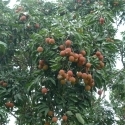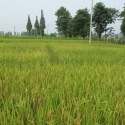08 Oct 2012
Returning crop residue to soil alleviates potassium deficiency
Nutrient management under straw mulch
 Rice growth under straw mulch minus K vs no straw mulch plus K
Rice growth under straw mulch minus K vs no straw mulch plus K
In review of massive data generated from field experiments of the Soil-testing Based Fertilizer Recommendations Program conducted from 2006 to 2011 in Sichuan province, it revealed that returning crop residue to soil could not only alleviate potassium deficiency in crops but also decline potassium use efficiency. Soil test indicated that soils in Chengdu Plane had the lowest available K content in the province, about 79% of the soil samples that contained available K below the critical value. However, the crops showed the lowest responses to added fertilizer K in the region. This seemed contradictory and puzzled local scientists and technicians for some time. After thoroughly study and analysis, it was found that the lack of crop responses to added fertilizer K was due to recycling crop residues in the region. Recycled crop residues invisibly added considerable amounts of K to the soil and in return significantly reduced crop responses to fertilizer K. Thus, crop residues are a valuable K source and can save mineral K when managed properly.




